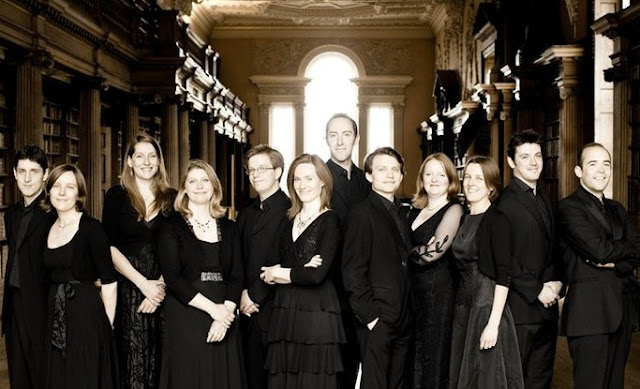 |
| The young singers of Stile Antico. |
Last weekend I got a double whammy of medieval and Renaissance polyphony - I caught the chart-topping Stile Antico (above) at the Boston Early Music Festival the night after I heard Boston's own Blue Heron.
And, like a few other people, I found the contrast didn't flatter the better-known band.
This is my second encounter with the Stile Antico kids (sorry, they just seem so young and earnest) - and this was also the second time I left scratching my head after one of their concerts. It's not that they aren't often quite good - they are, not to mention super-serious about sacred music and polyphony, and so awkwardly genteel that sometimes, during one of their tweedy "Ladies-and-gentlemen-might-I-beg-of-you-a-moment-of-your-time" interludes, I felt myself suppressing an affectionate giggle.
And yet, I have to say Stile Antico can be a little dull in long doses, even though one facet of their performances - the soprano line, handled mostly by two women who must be sisters (they share a surname) - is almost too focused and powerful for the profile of the rest of the group. (Which makes me wonder if couple-dom and other relationships figure in the rest of the line-up as much as vocal talent does - there's a faintly in-bred, college-campus air about these guys.)
Those sopranos - Helen and Kate Ashby (along with Rebecca Hickey) - may be the group's only clear artistic signature, but you can't deny they command attention: these ladies boast a combination of perfect pitch, pure tone, and pure power that I don't think I've heard anywhere else; listening to them, you do wonder whether this might be how the angels sound (and no doubt their intensity is what drew the attention of Sting, with whom Stile Antico has toured). Still, these ladies inevitably, and repetitively, tip every piece in their own direction (there are some good voices among the tenors, but elsewhere things are variable) - and that's not really the idea behind polyphony. Sorry, it's just not.
There was one great exception to this general rule in last Saturday's concert - Tallis's Videte miraculum, from his Christmas Mass, Missa Puer natus est, written for the crazily-Catholic Queen Mary, back in the days when England was schizophrenically swinging back and forth between the Anglican and Catholic churches. For a Christmas mass, Puer natus est is a little melancholic (in one of those strange resonances between art and life, it was written when Queen Mary imagined she was pregnant - only she wasn't); but one of the great things about Tallis is the way his vocal works delineate gigantic sonic architectures - rather like the cathedrals in which they were often sung - and for once Stile Antico achieved a rare sense of balanced, detailed expansiveness.
Elsewhere, alas, things often slowed into a blurry trudge (the Anticans make all their artistic decisions collectively, so they rarely hit on a striking individual statement), broken by sudden, siren-like wake-up calls from the sopranos. Sometimes even the transitions and transformations that the singers called attention to in their comments, like the shift from minor to major in Robert White's Magnificat, were a little hard to parse (subtlety is oft doomed in a collective). And few of the pieces by Tallis's contemporary William Byrd made much of an impression, I thought - although Taverner's Audivi vocem de caelo was compellingly sung (by the women only, from the back of the church), and things suddenly picked up at the finish, with a truly ecstatic reading of John Sheppard's Verbum caro factum est (drawn from the opening of the Gospel of St. John). And the encore, a motet by Tomás Luis de Victoria, was nearly as good. It struck me that Stile Antico's true strength isn't actually polyphony at all; they seem to make their best impression with the single, simple power-chord.
